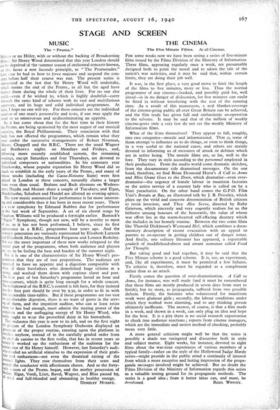STAGE AND SCREEN
MUSIC
The ,4 Proms."
HITLER or no Hitler, with or without the backing of Broadcasting Nous:, Sir Henry Wood determined that this year London should not be deprived of the sturuner season of orchestral concerts known, on the lupus a non lucendo principle, as " The Promenades." Last year he had to bow to force majeure and suspend the con- certs before half their course was run. The present series is announced as the last that Sir Henry Wood will undertake, which means the end of the Proms., as all but the aged have known them during the whole of their lives. For no one else could—even if he wished to, which is highly doubtful—carry through the same kind of scheme with its vast and multifarious repertory, and its huge and solid individual programmes. At least, I hope no one will try. For these concerts are the individual creation of one man's personality and taste, if one may apply the word to so omnivorous and undiscriminating an appetite.
So it has come about that for the first time in their history the Proms. are being sponsored by the most august of our musical societies, the Royal Philharmonic. Their association with that body has not affected the programmes, which remain what they were under the successive managements of Robert Newman, Messrs. Chappell and the B.B.C. There are the usual Wagner and Beethoven nights on Mondays and Fridays, and, following more recently established custom, the remaining evenings, except Saturdays and four Thursdays, are devoted to individual composers or nationalities. In his centenary year Tchaikovsky, whose popular reputation Sir Henry Wood did so much to establish in the early years of the Proms., and many of whose works (including the Casse-Noisette Suite) were first played in London at these concerts, naturally claims a larger share even than usual. Brahms and Bach alternate on Wednes- days; Haydn and Mozart share a couple of Tuesdays; and Elgar, Mendelssolm; Schubert and Handel are allotted an evening apiece. The new music announced for performance is far more interest- ing and considerable than it has been in most recent years. There is a new symphony by Edmund Rubbra due for performance in the last week of September. A set of six choral songs by Vaughan Williams will be produced a fortnight earlier. Bantock's "Pagan" Symphony, though not new, will be a novelty to most of us, as it has not been performed, I believe, since its first appearance in a B.B.C. programme four years ago. And the younger generation are variously represented by Elisabeth Lutyens and Elizabeth Maconchy, Howard Ferguson and Lennox Berkeley. Nor are the more important of these new works relegated to the second part of the programme, when both audience and players are upi to be feeling the heat and burden of the summer night. For it is one of the characteristics of Sir Henry Wood's pro- grammes that they are of vast proportions. The audience are expected to have an appetite and a digestion comparable with those of their forefathers who demolished huge sirloins at a sitting, and washed them down with copious claret and port. The first part of last Saturday's programme lasted an hour and three-quarters, which is quite long enough for a whole concert. The withdrawal of the B.B.C.'s control is felt here, for they insisted that the first part should be over by 9.3o, in order to fit in with theit inexorable time-tables. But if these programmes are too vast for comfortable digestion, there is no want of gusto in the serv- ing of them, and the impatient auditor, who can at least retire when he has had enough, must admire the staying power of the orchestra and the unflagging energy of Sir Henry Wood, who really ought to wear the proverbial daisy in his buttonhole. The orchestra this year is new to its job, and on the first night the prayers of the London Symphony Orchestra displayed an prance of the proper routine, entering upon the platform in hunches anyhow, instead of in the carefully graded order from the chef de cuisine to the first violin, that has in recent years so barurally worked up the enthusiasm of the audience for the IPPear,aace of Sir Henry himself. However, last Saturday's audi- ence needed no artificial stimulus to the expression of their grad- e and enthusiasm—not even the theatrical raising of the imeted lights. They rose themselves from their seats and greet ttd the conductor with affectionate cheers. And so the forty- 4111 season of the Proms. began, and the motley procession of Elgar, Verdi, Liszt, Ravel, Wagner, and Bliss passed by, LI vivid and full-blooded and abounding in healthy energy. DYNELEY HUSSEY.


























 Previous page
Previous page